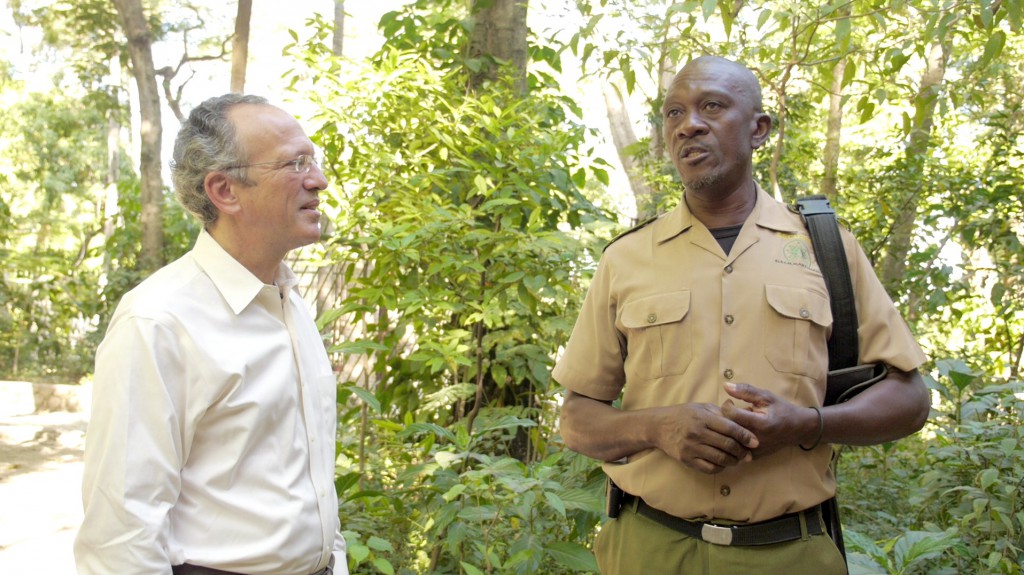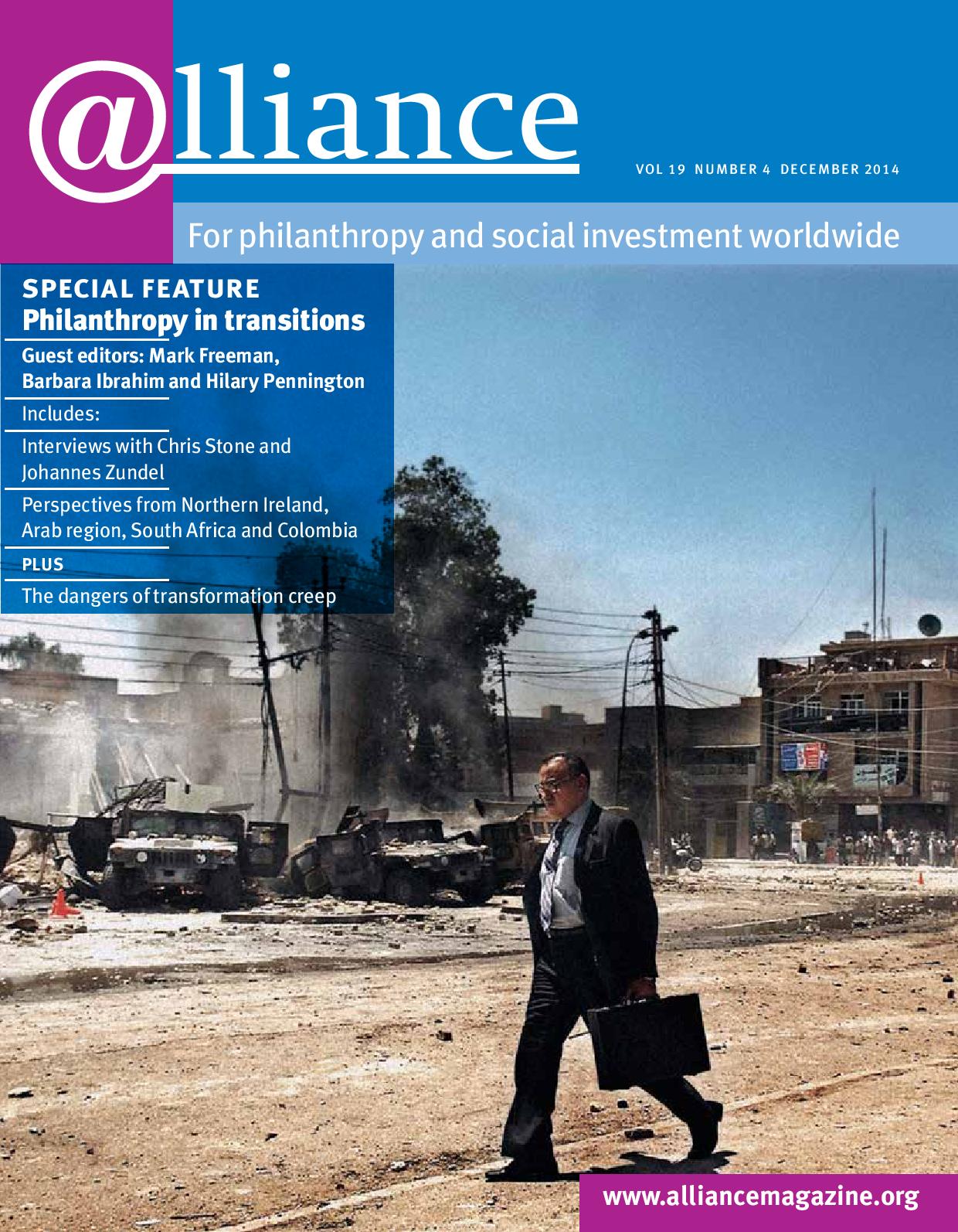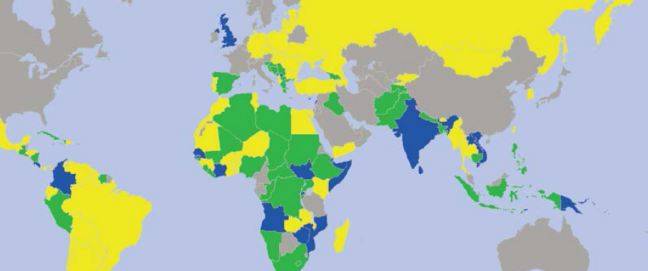Experience in both Central and Eastern Europe and the Middle East shows that democratic gains made when authoritarian regimes fall are often fragile. How can they be protected? Can institutions that work elsewhere be exported into transition states? And what can foundations do to nurture independent institutions? Barbara Ibrahim and Mark Freeman discussed these questions with Chris Stone, president of the Open Society Foundations.
The early days of the Arab Spring seemed to suggest that philanthropy’s biggest asset could be its agility and freedom to move quickly when opportunities arise and that foundations should be prepared to take more risks to support movements for democracy. However, the setbacks have made us wonder: were we too optimistic? Replicating things that appear to have worked in one place seems almost never to be successful, yet that’s what seems to still happen in practice. The impulse to emulate rather than to innovate is huge. What’s your experience of this?
When Mandela became president of South Africa in the 1990s, there was a big problem with rapidly rising organized crime. The government wanted to adopt a law that allowed the state to seize the proceeds as part of a prosecution. American advisers showed them the RICO statute in the US and they promptly adopted a version it. When the first five or six cases were all overturned or thrown out on appeal, they realized that the RICO statute depended on a code of evidence that existed in the US but not in South Africa. When they complained to their advisers, they told them they should have adopted the code of evidence, too. What looks like an individual innovation is actually tied to countless elements of a society’s culture and history, so it’s very hard to make replication work.
There is a famous story, probably apocryphal, that McDonald’s used to rejig the formula for a Big Mac in each new country they moved into. But this approach wasn’t working for them and they finally decided it was easier to change the tastes in each country than to customize the product. Things don’t work that way with government reform: you’re not going to remake everything in the society. I’m not sure it works with cuisine, either, but I’ll leave that for others.
So how do you respond if people from a transition country ask you, ‘What do I need to know from other places?’
Let me illustrate that with a story from China. When China began to open up in the 1980s and early 1990s, and they reopened their courts and began to draft new codes, the American Bar Association translated various codes from the US and the European Union did the same. If you walked into a court ten years later, none of those things were present, because they were irrelevant to the Chinese justice system. The Chinese realized this before the people providing the assistance did.
In the early 2000s, they decided they should ask different countries to advise them about how they dealt with a particular crime in their jurisdiction. After six months, the Chinese knew more about solving the problem than any of the people advising them. They were the only ones with the transnational experience.
In drawing up its non-profit law in the 1990s, the South African government under Mandela asked the British for help, and they learned about the Charity Commission. They asked the Americans for help and they learned about 501(c)(3)s and (c)(4)s and then they adopted their own version, with elements of each. So if you’re trying to help new governments, I think the first lesson is to help them to understand a range of possible experiences, and the weaknesses as well as the strengths of each, rather than to find the model that they ought to adopt.
The second lesson is, whatever they do, it won’t work completely. So don’t try to find the perfect solution and implement it, but rather start somewhere and adjust it with the benefit of experience. In China, there’s now what we’re calling the Empirical Legal Reform Movement: instead of going abroad and looking for models, people are now going around inside China, gathering data about what is happening, and trying to fix problems that way.
The second lesson is, whatever they do, it won’t work completely. So don’t try to find the perfect solution and implement it, but rather start somewhere and adjust it with the benefit of experience.
In the US, when we have a problem in one of our institutions, we don’t ask the French to send us a translation of their code and adopt it. We try and work out for ourselves what’s wrong. The important thing is the method of reform, not the content.
Are there other lessons to be taken from the setbacks in democratic transitions that we’ve been witnessing?
With the end of communism in Eastern Europe, many people unconsciously assumed that change was moving in one direction: you could get countries out of the Soviet orbit, fund new institutions, and encourage new governments which would eventually join the EU, and that would somehow protect democracy and open society. That assumption has proved to be false. Working in the justice sector, you know that progress is easily lost. Even countries that imagine they are the world’s greatest democracies can have horrendous injustices in their institutions. OSF is very worried about Hungary, an EU member, which is slipping into a frighteningly repressive state, and the EU is doing next to nothing about it.
What, to me, is harder to explain is why these things ever succeed, not why some fail. Why is Tunisia hanging in there and why has Euromaidan in Ukraine, at least so far, gotten further than anybody would have imagined?

Chris Stone in Martissant Park, Port-Au-Prince, Haiti, a project of Open Society’s local foundation FOKAL.
Do you see anything unique about the transitions of this last decade?
Many believed that social media explained why the protest in Tahrir Square happened so quickly. Obviously that was a factor, but we saw a lot of the first revolution in Ukraine happen without it. The whole world is communicating and participating in events in different ways, but I don’t know that the fundamental dynamics are that different. The Open Society Foundation in Ukraine was founded in the late 1980s, before the Berlin Wall fell, so its staff and board went through the end of the Soviet Union and the Orange Revolution. I think the ability to learn from those early experiences has been vital for them.
We are supporting an effort, in partnership with the European Bank for Reconstruction and Development, to build a group of Ukrainian economists and other political scientists to advise the transitional government on reforms. This group is supported by an outer ring of international economists, government reformers and experts. And the whole thing is then integrated with the prime minister’s and president’s offices. This is a deliberate shift from the more international expert group that was established in 2005, which didn’t work. They won’t get it all right, but it’s impressive to see that kind of deliberate, studied approach to making this transition more successful than the last one.
The OSF ‘hybrid’ form of local foundation is a good way of supporting effective local philanthropy with international input. Do you think of trying that in really tough places like Egypt?
We can’t operate national foundations in countries where the government is actively hostile. We used to have a foundation in Azerbaijan, for example, which we can no longer operate because of the hostility of the government. But we do support civil society organizations in lots of countries where we don’t have foundations. We do a lot of grantmaking in China, for example. The government is aware of this, but we don’t have a national foundation there and I don’t think we will any time soon.
Regardless of whether we have a national foundation, we always try to ground our work in local knowledge and direction. We have a regional foundation in East Africa with a headquarters in Nairobi, which has just selected a new director. The board consulted with me, but the choice was theirs. They approve their grants, and the director will report jointly to them, all East Africans, and to the regional director for Africa in the global foundation. There are over 400 board members in the OSF network of entities. That’s a lot of different decision-making loci and for me it’s a huge strength: if you’re trying to support transitions, it’s crucial to be really grounded in the local context and to trust the people you have there.
How do you see OSF’s engagement when transitions happen in the really hard places, the fragile states where there are deep divisions and key public institutions are lacking, where there’s barely even an idea of a society that everyone is part of?
What I’ve learned in the last couple of years is that there are some fundamental building blocks that OSF works on, even in the most difficult of environments. It stems from George Soros’s confidence that information and the ability to communicate are the starting point for both political and socioeconomic progress. I think it’s symbolic that during the war in Yugoslavia, when governments were vainly trying to relieve the siege of Sarajevo, he ran three things through the tunnels into the city: water, seeds and newsprint. The idea that newsprint would be the third essential element to keep a society alive under siege says a lot about OSF, and I think that’s certainly one of the starting points.
Similarly, scholarships to enable students to study and expand their knowledge is one of our starting points even in some of the most closed societies. And when we can’t do anything else, funding the arts and funding storytellers – whether through film, photography, dance, theatre, fiction or comedy – are probably the elemental building blocks that we try to support wherever we can.
There’s an impression that OSF gets closer to politics than philanthropy normally does. Is that because you feel you have to do so in order to be relevant in a period of national transition?
I think we focus on transitions because we are more political. We’re not more political because we focus on transitions. In the US we’re political as well and it’s not about transition.
A lot of American philanthropy avoids politics for a number of reasons. Although the law is sometimes cited as an excuse, US law allows you to be much more political than most philanthropies choose to be, as the Atlantic Philanthropies, Pierre Omidyar and others have shown. But I think this is easier for a single active donor and founder. Take the Koch brothers, Mike Bloomberg and George Soros: very different ideologies, very different places on the political spectrum, but all three are pursuing philanthropy in an explicitly political way. We don’t support individual party candidates, though legally we could, because of George Soros’s philosophy of pluralism. Our version of politics is that no one party is right or wrong, and that the truth is almost always in the views of the different parties. But we also believe that you can’t make real change while you’re ignoring the political realm.
What role do you see for civil society in times of transition?
One issue here is the division of roles. Civil society groups built around individual dissidents or victim groups and campaigning globally need different skills for collaborating with a transitional government in the implementation of institutional changes. There’s often a division of labour in a transition between those who continue to criticize and those who collaborate, and that’s an awkward division to work out. Some advocacy you can do from inside, but sometimes there’s criticism that needs to be made that you can’t do if you’re also trying to work in partnership. Not that this is just a transitional question. The campaigning/governing division is an old cliché of American politics. You can see it as an individual candidate tries to move from a campaigner to a governor.
Ukraine is more ambiguous because of the war. But in Tunisia, Indonesia and Senegal, there’s real optimism about progress towards an open society. But that doesn’t mean we’re going to import programmes or laws or legal institutions from longer-standing democracies, and there is less of an idea that government will be the answer. That happened in South Africa, and civil society lost its edge. In the next ten years, civil society in South Africa is heading into a second adulthood. There was the adulthood of struggle, followed now by the adulthood of democracy.
Are there any developments in the philanthropy world that give you hope that we’ll respond better in future to these very unique historical moments?
Over the last two decades, it was often said at OSF and elsewhere that we could get change to the point where it would be irreversible. I think we’ve learned that there is no such point, that there is no change that is irreversible. But, paradoxically, I think that’s a cause for hope. Because knowing that allows you to act, with humility but also with persistence.
Which means that we should not say that transitions have failed after merely two years?
Exactly.
Chris Stone is president of the Open Society Foundations. He is an international expert on criminal justice reform and on the leadership and governance of non-profits. Prior to joining OSF, he was the Guggenheim Professor of the Practice of Criminal Justice at Harvard University’s John F Kennedy School of Government and director of the Hauser Center for Nonprofit Organizations.
For more information
http://www.opensocietyfoundations.org







Comments (0)